- Home
- Katherine Paterson
The Day of the Pelican Page 2
The Day of the Pelican Read online
Page 2
The warmth of spring turned too early into the heat of summer. The ubiquitous crows were squawking over territory and bits of food like old women squabbling in the marketplace. Even with all the windows open, the classroom on that last day of May was stifling. All Meli wanted was to be outdoors—not crowded with fifty other upper-grade children into a room of the house the Albanians used for a school. All the regular schools now belonged to the Serbs.
It was so hot that Meli found herself nodding as Mr. Uka droned on and on. To keep awake, she began to study the teacher's nose. It was so big. It occurred to her that Mr. Uka reminded her of a pelican. He was so patriotic that he should have looked like a proper Kosovar stork, but his nose was bulbous, not long and patrician. Alas, much closer kin to the pelicans she d seen in books than to a stork. In her boredom, she drew a picture of a pelican that looked surprisingly like Mr. Uka. Zana, who shared her desk, peered over Meli's arm. She began to giggle. It was contagious. Meli couldn't help herself.
"Zana, Meli, come to the front," Mr. Uka ordered.
Meli tried to slip the picture into her pocket, but it was too late. Mr. Uka held out his hand. He studied the picture for a minute. Don't let him see the resemblance. "Very clever," he said. "But what do pelicans have to do with the history of Kosovo?"
"Nothing, sir," Meli mumbled. Even with her back to Mehmet, she could feel his disapproval. She didn't dare look. She knew how angry her brother must be.
"Then we will keep the pelican for science class," the teacher said. "And I would like the two of you to stay after school to catch up on history."
When Mr. Uka finally dismissed the girls, Mehmet was nowhere to be seen. He ran home to tattle on me, Meli thought. It wasn't fair. Baba would want an explanation as to why Mehmet hadn't waited—why he was letting the girls walk home alone. Baba had told him months ago that he was to look out for them. Their father would be angry with them both.
As always, the girls had to pass the police station on their way. A Serb policeman was loitering outside. "Where are you girls headed?" he asked. He spoke, of course, in Serbian, and Meli had sense enough to answer in the same language. "Just home," she said. The man shrugged. Out of sight of the station the girls walked faster, and once she had left Zana at her house, Meli broke into a run. She was very late.
Yes, there was Baba waiting outside the store. "Meli," he said. "Praise God, you re home. But where is Mehmet?"
TWO Mehmet Is Missing
BABA'S QUESTION HIT MELI LIKE A BLOW TO HER CHEST. What on earth did he mean?
"Where's Mehmet?" he asked again. "He isn't with you?"
She shook her head, and when she opened her mouth, her voice shook as well. "Mr. Uka made me and Zana stay after dismissal. I—I thought Mehmet would be here already."
Baba didn't ask her why she d had to stay after school. He would have known it was for punishment, but he seemed not to care. "I told Mehmet to come straight home. I had work for him at the store." He began to pace up and down the street, but when he got to the corner, he stopped himself and came back to where Meli stood. "Come inside. It won't do for us to talk in the street."
There were no customers in the store. Still, Baba led Meli to the back corner. She found herself looking over her shoulder to see if anyone was coming to the door while her father talked. She had never seen him look fearful before, and it frightened her. "What did he say to you?" he asked. "Was he running off to play soccer again?"
"He didn't speak to me after school, Baba. I—I think he was angry because I misbehaved and had to stay late. I thought he was coming right home."
"Tell your mama to come down here."
"Baba. You don't think anything has happened to Mehmet?" Sometimes Albanian men disappeared, but Mehmet was only thirteen. Surely...
"Just get your mother. You stay and watch the little ones. And don't frighten them."
She climbed the inside stairs to the apartment. The boys were playing in the garden as usual. Mama was in the kitchen preparing supper, and Vlora was sitting on a high stool pretending to help. Mama looked up when Meli came into the room. "Meli. You children are very late today."
"Baba needs you downstairs for a minute, Mama. Vlora and I will finish making supper, won't we, Vlora?"
Vlora smiled. "I'm making stew," she said.
It was many minutes before Mama came back up the stairs. She was breathing heavily. "Baba's going around to Neshim's," she said. "Those two boys probably got into a soccer game and forgot the time." She came close to Meli standing at the stove. "Try not to worry," she whispered, pushing a strand of hair from Meli's forehead.
How could Meli not worry? Her family lived in a country where people were known to disappear without a trace. Men, mostly—men who were suspected of Kosovo Liberation Army connections. But for all his posturing, Mehmet was only a boy. He wasn't part of the KLA. Surely not even a Serb policeman would think ... But who knew what those people thought?
Mama fed the youngsters early. When Isuf asked where Baba and Mehmet were, Mama just said, "Oh, Baba and Mehmet had some errands to run. They'll eat when they get home."
Meli couldn't believe how calm her mother sounded. Her own stomach was churning like an eggbeater.
Bedtime came for the young ones, and still no Baba or Mehmet. Meli tried to do her homework, though none of the math problems made sense and she soon gave up. She couldn't make her head work properly. Everything jumped about inside. She flipped on the television, but all the blare of Serbian propaganda just made her more nervous, and she switched it off and went to the front window to watch for them. Finally, she saw a figure emerge from the shadows. Surely it was Baba, although the man walking up the dark street was bent over like a ninety-year-old. She must go meet him. She had to hear his news, however terrible it was. She started toward the door, but Mama caught her arm. "Wait, Meli. It is better if we talk inside," she said.
Baba came through the side gate and up the stairs so slowly that Meli thought she might cry out before he actually reached the landing. In the light from the kitchen his face looked gray.
"No word?" Mama asked as she opened the door. It was more of a statement than a question.
Baba shook his head, sighing deeply as he took off his shoes at the door. He stumbled through into the living room and fell into a chair. "Neshim said he spoke to Mehmet after school." He went on, careful not to look at Meli. "He was angry, Neshim said, and not sure what he should do. He knew he was supposed to walk home with the girls, but he had promised to help me, so finally he just said he had to go and ran ahead." Baba sighed again. "That was the last Neshim saw of him—running up the street."
"What of his other friends?" Mama asked. "The other boys he plays soccer with. Surely someone saw him after that."
"I went from house to house. None of the boys know anything." The look that passed between her parents sent ice through Meli's whole body.
"I'm sure he's all right," Meli said. "He has to be." The words were hardly out of her mouth before she knew how foolish and desperate she sounded.
"Inshallah," murmured Mama.
Inshallah. God willing. Yes, please, God, Meli prayed. Let him be safe.
"You must eat some supper, Hashim," Mama said. "It's very late."
Her father shook his head. "How can I eat when my firstborn is missing and I don't know where he is to be found?" He lurched to his feet. "We will both be home soon. Inshallah."
"Hashim. Where are you going?"
"To the police," Baba said.
"No, not the police."
"They are the only ones who know where my son is. You know that is true, Sevdie." He walked out the door, leaving it open behind him.
"Go with him, Meli," Mama said. "Perhaps they won't arrest him if he has his daughter with him."
Her father soon realized that Meli was following him up the street. "Go home, child," he said. "Stay with your mother. She's already anxious about your brother. I don't want her to have to worry about you as well."
Me
li just shook her head. As scared as she was, she was determined to do as Mama had asked. The police had seen her walk past every day with Mehmet. They might remember that the two of them were only schoolchildren, not terrorists to be jailed ... or tortured ... or ... killed. She closed her eyes to shut out such thoughts.
The station door was locked. Her father knocked, and when nobody answered, he beat on the heavy wooden door with his fist.
"No, Baba," Meli begged. "You'll make them angry."
He ignored her and kept right on beating until the door opened wide enough for a pistol to stick out through the crack. "What do you want?" a voice demanded in Serbian.
"I need your help," Baba said meekly, as though he really believed a Serb policeman would help an Albanian. "My son never returned home from school today."
"So? Can I help it if your boy has run away?"
Baba stuck his big hand in the crack and forced it open wider, ignoring the pistol in the officer's hand. Watching, Meli could hardly breathe. "I think one of your men has made a mistake. My son is only a schoolboy. He knows nothing of politics." It was a lie. Mehmet knew plenty about politics, but of course what her father meant was that Mehmet was not a part of the KLA.
"Who are you?"
"My name is Hashim Lleshi. I own a small grocery store on the west side of town. This is my daughter, Meli. My son, Mehmet, who is missing, is only thirteen. He—is he here? Do you have him in custody? By mistake? Perhaps you have confused him with someone else?"
"Come back in the morning if you have a question."
"But to make a child spend the night in jail ... He ... Do you have children?" Baba's voice was low and pleading now. It hurt Meli to hear him humiliate himself before this Serb, but she knew he was determined to do whatever it took to get Mehmet safely home.
"I said, come back in the morning!" The policeman poked her father with the pistol to force him out of the doorway. "And be glad I didn't arrest you."
"Come on, Baba," Meli whispered.
Reluctantly, her father backed away. Once again he became the old man Meli had seen coming up the street. "Pray for your brother, Meli," he said. They were the only words he spoke during the long walk home. She did pray, or tried to; they were not a family who practiced daily prayers. As they walked past the dark shadow of the mosque, she prayed that God would not hold their lack of piety against them. Surely he wouldn't. God was the all-merciful, wasn't he?
Baba and Meli went back to the station the next morning, but the result was the same. The Serbian police would not even say if Mehmet was in the jail or not.
***
In the weeks following Mehmet's disappearance, the family went through the motions of getting up in the morning, eating, working, and lying down to sleepless nights. Meli couldn't make herself go to school, and her parents didn't seem to have the energy to insist. Suppose something should happen while she was at school? It didn't make sense, but somehow she reckoned that since she had been the cause of her brother's disappearance, she had to be home to make him come back safely. Whenever she wasn't working in the store or helping Mama with housework, she was standing at the front window, straining to see Mehmet turning the corner, coming down the side street, walking through the gate, climbing the stairs. He was laughing as he took off his shoes and came into the apartment.
Sometimes she changed the picture in her mind. This time Mehmet was walking down the street, opening the door of the shop. She imagined the bell ringing to announce his entrance, and Baba rushing forward to embrace him....
Meli rehearsed these scenes day after day, time after time. Once, as she stood at the window, Mama came over and put her arm around her daughter's shoulders.
"It won't bring him home sooner," Mama said gently.
But it might. If only 1 stare long enough and hard enough, 1 can will him home. In part of her mind Meli knew this was foolishness, but she couldn't seem to help herself. It was guilt that drove her. If only she had behaved that day in school, Mehmet would be home now, teasing her, lording it over her.
Zana had called the very first day to ask why she hadn't come by, why she and Mehmet had missed school. "What's the matter, Meli? Are you both sick?"
"No, not exactly. It's ... it's ... I can't talk about it on the phone."
But even when Zana came to the apartment, Meli could only say, "Mehmet is missing. We don't know anything."
Zana had hugged her, but Meli hadn't been able to cry. She couldn't even say, It's all my fault! The words stuck like burrs in her dry throat.
***
Meli turned twelve in June. Mama made a little cake, but no one felt like celebrating. Still no word. And then one evening, when she wasn't even looking, Mehmet appeared. At first when Meli saw him in the doorway, she couldn't believe it was him. He was so thin. Besides, he had knocked on the kitchen door. When had Mehmet ever knocked on his own door?
"Mehmet?"
The ghost-like figure nodded. "Not a pelican," he said, stepping out of his shoes—or what was left of them.
Meli reached out and pulled her brother over the threshold. "Mama! Baba! It's Mehmet. He's come home!" She tried not to stare at his thin face as he bent to take off what was left of his once-shiny shoes, but she couldn't help herself.
Mama came running from the bedroom, nearly knocking Meli to the floor as she threw her arms around her son. "My Mehmet!" she cried. "Oh, my Mehmet." She led him to a chair and sat him down. "I have goulash," she said. "You must be hungry. Go get Baba, Meli. He must see his firstborn."
The family just stood and watched as Mehmet ate the goulash Mama heated up for him. The little boys pressed themselves against their brother's chair while Vlora jumped up and down with joy, but Meli and her parents were standing, staring at Mehmet as though he would disappear if they took their eyes from him. Occasionally, Baba would touch Mehmet's shoulder, as though making sure his son was still there. Their heads were crowded with questions, but no one knew what to ask or how to begin asking.
It was, as usual, Mehmet who spoke first. "The bastards beat me up and then took me out to the countryside and dumped me." He paused for a long time, looking down at his empty bowl. Nobody moved. "I guess they thought they'd killed me."
A little cry escaped Mama's lips. Her hand flew to her mouth.
"But I wasn't dead." Mehmet gave a short, bitter laugh. "Some KLA men found me. They took care of me until I was well. I wanted to stay with them, help them kill those devils, but ... but they made me come home."
"Thank God," Baba whispered.
"They said I must tell you Uncle Fadil was right," he said. "We can't stay here. We have to leave as soon as possible."
THREE Leaving Home
BABA CALLED A COUSIN WHO LIVED ON THE OTHER SIDE of town to come look after the shop in the Lleshis' absence. No one in his family had tangled with the police. They had no reason to flee. The cousin was overjoyed. He came immediately for the extra keys to the store and the apartment. His family would move in the very next day. Perhaps it was unreasonable, but his delight angered Meli. The cousin was a lazy man who had never in his entire life worked as hard as Baba did in a single day. It wasn't fair that he should have their nice apartment and all the food in the store for nothing—even if for only a few weeks.
There was no telephone at the farm, so as soon as the matter was settled with his cousin, Baba got on his bicycle and rode out to the country. It was almost dusk when he returned in the Lada with Uncle Fadil. Although Uncle Fadil kept insisting that there was plenty of food at the farm, Mama and Baba were determined not to be any more of a burden than necessary. The men and Mehmet loaded the back of the car with fifty-pound sacks of flour, cases of cooking oil, sacks of onions and potatoes, big cans of white cheese, some jars of honey and plum jam, and a box of assorted canned goods: the goulash that Mehmet liked and the pashteta that Baba liked to spread on his bread in the morning. Thick coils of spicy sausage almost masked the usual smells of the old car. Space, though hardly enough, was left just behin
d the front seat for the four older children. The family was ready—or as ready as they could be—to leave the only home the children had ever known, with no idea of when they would see it again.
"Wait," said Mama, as Meli was about to climb over the front seat into the tiny space behind it. "My photo—my parents photo!"
Meli took the key from Baba and ran back up the outside stairs. Out of habit she slipped off her shoes at the door and raced into the living room. Her hands were shaking as she took the picture down from its special place atop the television set. The grandparents she had never known stared out at her as though wondering why they must leave their comfortable setting. She got a towel from the bathroom and wrapped the picture in it to protect the glass. Don't drop it! she told her shaking hands as she stuffed her feet into her shoes and, the precious picture tucked under her arm, closed and locked the door behind her. Slowly, she descended the steps, went out the gate, and returned to the waiting family.
She didn't look back. She hadn't said good-bye to her room, or the kitchen, or the living room. She hadn't said good-bye to her school, or even to Zana, who would never understand how she could leave without a word. But she wouldn't cry. We must all be brave, she kept telling herself. Besides, we'll be back soon. Of course we will. But something echoed deep and dark inside her stomach: Inshallah. God willing.
Mama, Baba, and Vlora were crowded into the front seat of the car with Uncle Fadil. Meli, Mehmet, Isuf, and Adil were in the rear. They sat facing backwards, their spines slammed against the front seat, their knees drawn up against their chests, surrounded by what were for now the family belongings. Mama had insisted that they bring their winter jackets and a blanket for everyone. It was summertime; surely they'd be home before anyone needed a jacket. Although Auntie Burbuqe had plenty of utensils for cooking and eating, there were some Mama couldn't bear to leave behind for the careless cousins to misuse. No furniture, of course—the foodstuffs were the important cargo. Vlora had been allowed one doll, but there were no other toys in the car. They had left so much behind, but at least Mama had her parents photograph. It was the only thing she had to remind her of her childhood home.

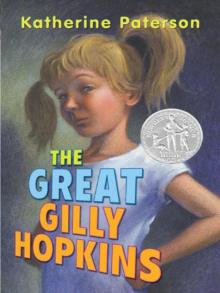 The Great Gilly Hopkins
The Great Gilly Hopkins Bridge to Terabithia
Bridge to Terabithia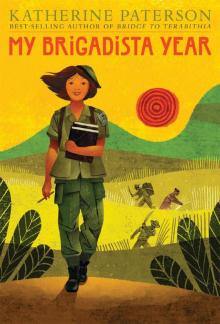 My Brigadista Year
My Brigadista Year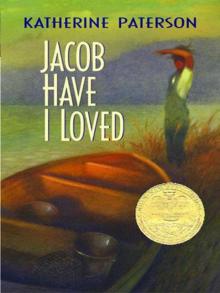 Jacob Have I Loved
Jacob Have I Loved Parzival: The Quest of the Grail Knight
Parzival: The Quest of the Grail Knight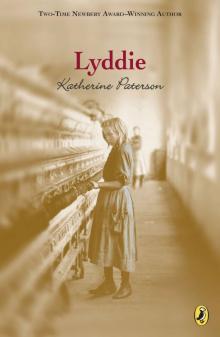 Lyddie
Lyddie The Day of the Pelican
The Day of the Pelican Stories of My Life
Stories of My Life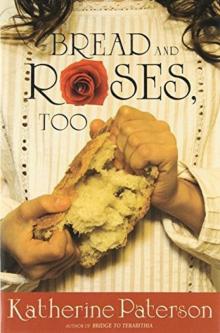 Bread and Roses, Too
Bread and Roses, Too The Same Stuff as Stars
The Same Stuff as Stars